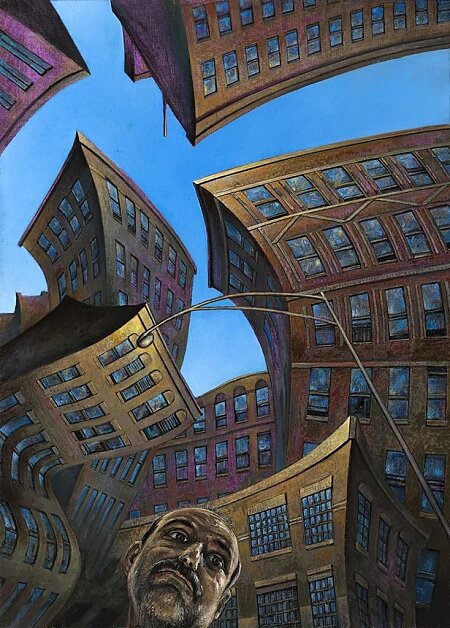
Elegy for a Sporting Goods Store
*
Customers were scarce by the time we worked there, in that sweet spot between the store’s halcyon days and its waning last breaths. Bud was convinced the place would be overrun with customers at any minute and so would have three or four of us work a shift at once, even when one or none would have sufficed. He ran the place like air traffic control or the stock market, something high-stress, in need of constant surveillance, vulnerable to unpredictable chaos, rather than what it was, a hole-in-the-wall, low-stakes corner store that sold jock straps to little-league teams. We were poor kids from broken homes selling cleats to popular kids from rich homes, and Bud knew it, which is maybe why he spent so much time motivating us. “Man your battle stations, boys!” he’d shout to no one in particular. Billy told us that Bud watched George C. Scott’s “Americans Love a Winner” speech from Patton every Saturday morning to ready himself for the onslaught of consumers (consumptionists, Bud called them, without apparent irony).
Still, megastores like Sports Authority picked off Bud’s consumptionists one by one, fewer and fewer of them popping in even to browse, mink-coated trophy moms preferring to drive the Mercedes or Lexus to the mall next to their Botox appointments, so we did what we could to keep ourselves busy. Bud had us do odd jobs for him: driving his wife to the airport, picking up groceries, bringing his girls to school sometimes. It was my job to pick up flowers and a card for his wife on her birthday (“A romantic card or a funny one?” I’d ask, and he’d say, “Surprise me”). One year, I noticed he hadn’t prompted me to pick up the annual flowers for their anniversary, a period when the store hadn’t been doing well and she wasn’t calling as much. Before school one day, I used my key to pop in and grab a hoodie from the rack since I’d left my jacket at my girlfriend’s house. It was early, around six. I was surprised to see the light on in the office. When I turned it off for whomever’d accidentally left it on the night before, I caught Bud sleeping on the couch back there, a suitcase of unfolded clothes open next to him like a slaughtered animal. He opened his eyes but only briefly, so that I wasn’t sure whether he registered me. I came back after school for work, and the suitcase was gone, as were his blanket and pillow. Bud was refreshed, alert, keyed up in jeans and a KISS T-shirt. “You bring me my coffee?” was all he said when I came in.
*
The store’s layout provided endless possibilities for bored teenagers with creative energy to burn, so we invented the Farrier Olympics. The glass bins in the middle of the showroom, which held primary-colored Russell© sweatshirts, became landing pads for racket balls we’d toss from across the store. We used the bench people sat on, discolored with age and cushions sunken in from suburban butts, as the net in impromptu games of tennis. The basement was its own gymnasium: six windowless aisles of unsold inventory, haphazard piles of boxes labeled not just with Nike and Adidas but also Umbro and Mizuno and BIKE and Shock Doctor and Mueller, vaguely categorized, divided by makeshift shelves. We’d turn off all the lights down there and attempt to tag each other with price guns in the pitch dark. We’d come back upstairs only if we heard the front door’s bell ring, welcoming the rare customer, or if Billy got tired of covering for us and called us up the stairs.
Billy was forty, a once-promising minor league baseball star who’d shattered his knee, gotten black-out drunk, and woken up working there twenty years earlier. Where Bud was hyperbolic, cartoonish, insistent on maintaining some semblance of employee-boss relations, Billy spoke to us plainly, on our level, a friend or older brother. He’d roll his eyes at Bud’s antics to make us laugh, but he’d also keep us in line when we screwed around too much. He took us all to High Fidelity when it came out, and for obvious reasons it resonated with us—Billy, going through a divorce at the time, possibly the most. It added another game to our unlimited list. “Top five three-piece bands,” Billy’d say, and we’d utter the words Nirvana and Cream and Rush. Billy would tell us to get more cultured when we named Green Day and Blink 182; we accused him of being stuck in the 80s when he’d say The Police and ZZ Top, our arguments soundtracked by New York’s Q104.3 Classic Rock station, which Bud kept dripping from the store’s stereos at all hours of operation. DJ Carol Miller famously fought to make “Born to Run” our state’s official anthem, and Billy had a crush on her. We couldn’t blame him. Anyone who felt that “A town full of losers, I’m pulling out of here to win” was a point of pride rather than a criticism understood us all deeply.
*
When he bought the store, Bud had been half-right: He didn’t really seem to need the doubtful rewards of an associate’s degree in business, since everything he needed to know he’d learned on the job. Bud knew everyone in town, a local boy made good: Having been a popular party boy in high school, Bud had turned those tenuous friendships into business by getting his old girlfriends to bring their sons in for Speed Demon© shin guards, their daughters in for STX© field hockey sticks. His old jock pals, the former star quarterbacks and varsity studs who were now alcoholic townies, coached Pop Warner and always bought the teams’ merch from Bud. He hired Billy then employed an endless line of teenaged dirtbags, probably in the hopes of molding one of us in his image, to his continued disappointment.
